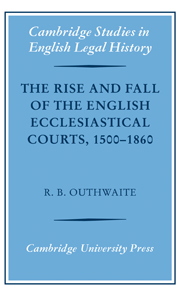Book contents
- Frontmatter
- Contents
- Foreword by R. H. Helmholz
- Preface
- Table of parliamentary statutes
- List of abbreviations
- 1 The ecclesiastical courts: structures and procedures
- 2 The business of the courts, 1500–1640
- 3 Tithe causes
- 4 Wills and testamentary causes
- 5 Defamation suits
- 6 Marital suits and marriage licences
- 7 Office causes
- 8 The roots of expansion and critical voices
- 9 Charting decline, 1640–1830
- 10 Explaining decline
- 11 The bills of 1733–1734
- 12 Snips and repairs: small steps to reform, 1753–1813
- 13 Royal commissions and early fruits, 1815–1832
- 14 Reform frustrated
- 15 Reforms thick and fast, 1854–1860
- Select bibliography
- Index
7 - Office causes
Published online by Cambridge University Press: 21 January 2010
- Frontmatter
- Contents
- Foreword by R. H. Helmholz
- Preface
- Table of parliamentary statutes
- List of abbreviations
- 1 The ecclesiastical courts: structures and procedures
- 2 The business of the courts, 1500–1640
- 3 Tithe causes
- 4 Wills and testamentary causes
- 5 Defamation suits
- 6 Marital suits and marriage licences
- 7 Office causes
- 8 The roots of expansion and critical voices
- 9 Charting decline, 1640–1830
- 10 Explaining decline
- 11 The bills of 1733–1734
- 12 Snips and repairs: small steps to reform, 1753–1813
- 13 Royal commissions and early fruits, 1815–1832
- 14 Reform frustrated
- 15 Reforms thick and fast, 1854–1860
- Select bibliography
- Index
Summary
The width of the church's jurisdiction with respect to discipline has already been noted. It was empowered to correct the behaviour of both clerics and laymen, not only to impose spiritual orthodoxy amongst them but also to regulate their morals and attempt to ensure social harmony in the communities in which they lived. Visitation articles reminded clergymen and churchwardens of their responsibilities in these respects and urged them to present for correction those whose behaviour fell short of acceptable standards. Most, but not all, of this correction was undertaken in the lower courts, the archdeaconry and commissary ones, during their periodic visitations of particular circuits. Offenders were named, mostly by churchwardens or by apparitors, and were summoned to appear at a particular time and place, where their cases were usually, but not invariably, dealt with summarily by the presiding judge.
The corrective work of the church courts increased after the Reformation, partly to impose new religious orthodoxies and partly to fill the regulatory vacuum that was created by both the ending of auricular confession and the decline in levels of activity in manorial, hundred and borough courts. Hill noted that in this period ‘visitations became more frequent and more thorough’, precipitating parliamentary complaints against them at the end of the sixteenth century and the beginning of the seventeenth century. Churchwardens became legally obliged to present written ‘bills of detections’ to ecclesiastical visitors and were sometimes prosecuted for their failure to do so.
- Type
- Chapter
- Information
- Publisher: Cambridge University PressPrint publication year: 2007



